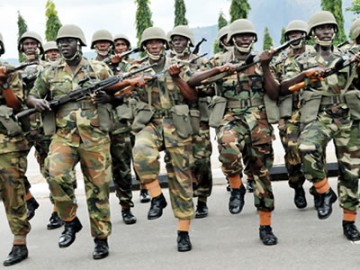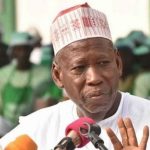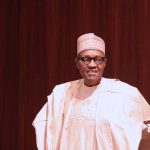Opinion: Why Military Might Alone Not Enough To Wipe Out Boko Haram
Articles/Opinion, Featured Contributors/Columnists, Latest Headlines Tuesday, June 9th, 2015
By Prof. R. A. Ipinyomi, University of Ilorin, Nigeria – Since General Muhammad Buhari of Nigeria officially took office as President and Commander-in-Chief of Nigeria Army Forces on May 29, 2015 we have noticed his greater involvement in checkmating the dreaded Islamist sect Boko Haram and its insurgencies. He had been to two or more foreign countries in search of what looks like “seeking the cooperation” to combat the insurgents. He has also ordered the movement of military command headquarters possibly to Maiduguri and Sambisa Forest. He had attended the G-7 Summit that took place in Europe and putting the insecurity of his country in the front burner. We cannot over sound the insurgencies caused either by Boko Haram, ISIS, Al-Qaida, pipe line venders, delta militants, kidnappers, day and night armed robbers, ritual killers or religious intolerance. While we sympathize with President Buhari, recognize his zeal for Nigerians, a well trained and loyal Nigerian military general and a friend of victims of these insurgencies we must also caution and advise him.
Let us clear the air on “who and who” may be serving or supporting these insurgents with particular reference to Boko Haram. The public perception and insinuation remain that those who promised to make the administration of former President Jonathan ungovernable must have been the same activists in Boko Haram. The 2009 uprising of Boko Haram increased violence was not read as change in the Boko Haram leadership but the coincidence with change from Yar’Adua to Jonathan, or from a Muslim to a Christian president. There is no doubt that there is a lot of confounding in the two movements but we should explain the factor of changing from a moderate (Yusuf) leader to a more extreme (Shekarau) in Boko Haram, which ought to be studied and digested.
We may also stress to the new Nigerian leaders that fighting radical religious beliefs and extremist ideology has never been an easy task for any nation. A Muslim friend told me that, “Many of those who write on radicalization among Muslims confuse the true values of the Islamic faith and mentality with extremism. They ignore the fact that for the average Muslims, Islam is the basis and context of their thoughts, feelings and behaviour. It touches every aspect of their lives; it inspires them, guides them in their relationship with rulers and officials, provides a framework for everyday actions, and leads them to improve their personal behavior and to raise their moral values and ethical standards. Further more in Islam politics and government are viewed as constituting a single sphere of the religion. Among the concepts that govern the relationship between the ruler and the ruled, and Muslims and non-Muslims, are duties of hearing and obedience, the pledge of allegiance, loyalty to Muslims and prohibition of allegiance to non-Muslims regarded as enemies, the promotion of virtue and the prevention of vice, assisting the nonbelievers against the believers, the concept of judgment, and the obligation of applying the Shariah as God’s Law”. We however believe that in order to avoid making mistakes that can damage the image of Islam and distort its provisions, these points and other concepts must be understood properly according to the correct interpretation in Islam. The adoption of narrow, erroneous or extremist interpretations of these concepts have been used to justify a widespread campaign of violence against governments, non Muslims and civilians in the name of Islam. The war against Boko Haram insurgents has therefore many components, fighting the physical beings and the violent acts that are visible in then, fighting the spiritual ideologies hidden and invisible, fighting views and social norms perceived by them as abnormal conducts like dressing (especially women), or fighting general injustices in the societies. One class of weapons cannot solve every problem.
The development of extremism in Nigeria goes back decades. The politically undertone or ethnic cleansing in the North 1966 after the first military coup in January that year and counter coup in July of same 1966 which left many Christians and Igbo people dead in Northern Nigeria cities. Consequently a movement for establishment of Shariah during several military regimes started as a nonviolent, symbolic, apolitical movement that confined its activities to individual acts, such as constitution amendment. There were no lectures or religious assemblies, or clerics making speeches and giving lectures about current affairs. Later however some religious figures started moving into the public realms, giving lectures and producing tapes of their ideas. These religious figures were influenced by extremist religious and political thinking imported from outside religious or Nigeria. Members of some external movements came into Nigeria and spreading their ideology in parts of the country which was accustomed to accepting whatever was presented to it in the name of Islam. These figures took the lead in Islamic studies in Lagos, Western Region of Nigeria and in many parts in the North moving from public schools and universities, influencing on many of the young generation and street begging children who were close to them. In this way, they created a group of followers and students who spread these views to others. Some of the views spread were not entirely only on Islam. We have had in this country some political extremism, Islamic extremism, Christianity extremism and other movements that are now sources of different insurgencies.
Another method of radicalization and recruitment emerged with advent of new social media in the form of text messages, telephone calls and discussions. Such communications set the stage for meetings with radical leaders, who then try to convince individuals to join their group. In this process, Boko Haram and other extremist groups use a variety of audiotapes, videotapes, and others to carry their radical ideology designed to recruit new members. We also understand that many books and audiotapes are brought into the country for this same purpose. Others are produced internally and distributed secretly. Fiery sermons, poems and passionate Islamic songs are also used, due to their potential for fueling the feelings of young people and making them more responsive to radical ideology. These false teachers use various jihad stories (usually false tales of successful jihad campaigns and interpretations of inspirational dreams) as motivation and justification for their missions. Misused religious texts about jihad in the name of God, the attainment of paradise, and the establishment of an Islamic Caliphate (Holy Land) in the North Eastern Nigeria are some of the tools used to inflame the youths’ emotions and passions. In Nigeria the poverty of our youth is usually taken advantage of at only a few coins. Once indoctrinated, the next step is to transfer words into action by planning, managing and executing violence in the name of Islam in the case of Boko Haram.
Hence even if America and her allies would bring their drones and command headquarters to Sambisa Forest to fight Boko Haram their technologies cannot recapture the minds and souls of our children already polluted and brainwashed. I am completely against amnesty either for Boko Haram or any insurgents because violence must not be seen to pay off. In education will compel and form students by force of reasoning to pass their examinations we don’t pay them off, or buy bread for the weak students, or pamper a violent behaving student. The stick and cane in the hand of the teacher together with his word must be able to correct errant and violent behaving students. There must be a fresh political will to solve the Boko Haram and similar insurgents in our country other than taking the cheapest options. It was wrong to have used the delta militants as guards on the high seas over the oil wells or the OPC as guards for the pipelines. Whoever took that decision was neither a friend of Nigeria nor a friend of the delta militants or OPC.
Parallel to military campaign must be another assignment for our religious leaders to win back these children that “strayed far away from Islam” according to President Buhari. In their straying they also erred and sinned. If God is alive let Him fight his own battles in our societies and in our lives. None of us should play God no matter in what form. I wish that economic development will come to the Sambisa Forest and all other “no man’s lands” that insurgents are currently hiding in. It is because of absence of government presence in many forests that give intruders opportunities to invade, raid, occupy and rob at will. The local governments in most states do not make their presence felt in areas they presently occupied but creation of more local governments is not the answer. Instead more competent officers and religious leaders should come to the rescue of the nation and the younger generations who may be further led astray by wrong teachings. War and military intervention are not the solutions.
By Prof. R. A. Ipinyomi
Related Posts
Short URL: https://www.africanexaminer.com/?p=23970






















